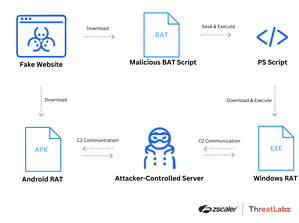
Some attackers use online meeting services as bait for malware. Researchers at Zscaler found fake Skype, Zoom and Google Meet websites that were used by threat actors to spread Remote Access Trojans – RAT for short.
Zscaler’s ThreatLabZ team warns about fake online meeting sites that distribute various malware families. Already at the beginning of December 2023, the researchers discovered a threat actor who creates fake Skype, Google Meet and Zoom websites to spread malware in order to spread remote access Trojans such as SpyNote RAT to Android users and NjRAT and DCRat to Windows users . These pages keep appearing in new versions.
Deceptively real web addresses as a trap
The malware actor…
Source link

